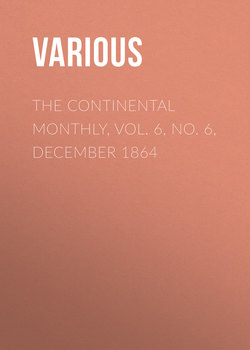The Continental Monthly, Vol. 6, No. 6, December 1864

Реклама. ООО «ЛитРес», ИНН: 7719571260.
Оглавление
Various. The Continental Monthly, Vol. 6, No. 6, December 1864
AN ARMY: ITS ORGANIZATION AND MOVEMENTS
FIFTH PAPER
REFERENCE
APHORISMS.—NO. XIV
ÆNONE:
A TALE OF SLAVE LIFE IN ROME
CHAPTER XVI
CHAPTER XVII
THE VISION
INSCRIBED TO TEACHERS TO CONTRABANDS IN THE SOUTH
THE UNDIVINE COMEDY—A POLISH DRAMA
PART IV
SELF-SACRIFICE
SHANGHAI: ITS STREETS, SHOPS, AND PEOPLE
COMPARATIVE VIEW OF MOVEMENT OF POPULATION OF
ON HEARING A 'TRIO
THE IDEAL MAN FOR UNIVERSAL IMITATION; OR, THE SINLESS PERFECTION OF JESUS
(A POSITIVE REPLY TO STRAUSS AND RENAN.)
HIS ABSOLUTE HOLINESS
UNITY OF VIRTUE AND PIETY
COMPLETENESS AND UNIVERSALITY OF HIS CHARACTER
HARMONY OF ALL GRACES AND VIRTUES
CHRIST'S PASSION
SUMMARY—CHRIST'S CHARACTER THE GREATEST MORAL MIRACLE IN HISTORY
APHORISMS.—NO. XV
SKETCHES OF AMERICAN LIFE AND SCENERY
VI.—TO SARANAC AND BACK
MOUNT TAHAWUS
TIDINGS OF VICTORY
THE ESTHETICS OF THE ROOT OF ALL EVIL
BANK NOTES AND GUINEAS
MIRACLES
LETTER OF HON. R. J. WALKER, IN FAVOR OF THE REËLECTION OF ABRAHAM LINCOLN
GENIUS
LITERARY NOTICES
SIZES AND PRICES
EDITOR'S TABLE
'COR UNUM, VIA UNA.'
GOD BLESS OUR NATIVE LAND!
Отрывок из книги
Before the enlightenment derived from the sad experiences of our present civil contest, upon the incidents of protracted warfare, probably most persons conceived of war as a scene of constant activity—a series of marches, battles, and sieges, with but few intervals of repose. History records only the active portions of war, taking but little account of the long periods consumed in the preliminary processes of organization and discipline, in the occupation of camps and cantonments, in the stationary watches of opposing armies, lying in the front of each other, both too weak for aggressive movements, but each strong enough to prevent such movements on the part of its opponent. Such matters, if noticed at all, are recorded in a few sentences, making no impression on the reader. Novels of the 'Charles O'Malley' class have also given incorrect ideas. Every page relates some adventure—every scene gleams with sabres and bayonets. Our three years' experience has taught us that the greater portion of an army's existence is spent in inactivity; that campaigning is performed only through one half of the year, and of that time probably not over one third is occupied in progressive movements. In the campaign of 1861, the only marches of the Army of the Potomac were to the battle field of Bull Run and the retreat. In 1862, after a march of fifteen miles to Fairfax Court House and returning, the army was transferred to Fortress Monroe and moved to Yorktown, where some weeks were passed in the trenches; it then proceeded up the Peninsula, and laid a month before Richmond; retreated to Harrison's Landing, and laid another month; returned to Fortress Monroe, and was shipped to the vicinity of Washington, marched for about a month, fought at Antietam, and then laid in camp a month; moved to Warrenton and remained a fortnight; proceeded to Fredericksburg and continued in camp all winter, except making the short movements which led to the battle of December, and the ineffective attempt to turn the rebel left, known as the 'mud march.' In all this long campaign, from March to December, a period of nearly nine months, spent in various operations, more than five months were passed in stationary camps—most of the time occupied, it is true, in picketing, entrenching, and other duties incident to positive military operations in proximity to an enemy, but very different from the duties connected with marching and fighting. The campaign of 1863 comprised a still smaller period of active movements. Commencing in April with the battle of Chancellorsville, it continued till the march to Mine Run in October—seven months; but considerable more than half the time was spent in camps at Falmouth, Warrenton, and Culpepper. The great campaign now in progress has consumed (at the time this article is written) three months, commencing after a six-months' interval of inaction, and already half the time has been spent in the trenches at Petersburg.
Since so large a portion of the time of an army is passed in camps, that branch of military science which governs the arrangement of forces when stationary, is one of considerable importance. It is in camps that armies are educated, that all the details of organization are systematized, that the morale of troops is cultivated, that a round of laborious though monotonous duties is performed. Nothing is so trying to the temper of the individuals composing an army as a long season in a stationary camp; nothing has more effect for good or for evil upon the army in the aggregate, than the mode in which the time, at such a season, is occupied. The commander who does not exercise care to have his camps pitched in the proper localities, to insure the observance of hygienic rules, and to keep his men employed sufficiently in military exercises, will have discontented, unhealthy, and indolent troops.
.....
Mary—inexorable spirit! God!!
And thou, second Mary, to whom I have so often prayed!
.....